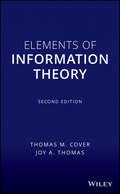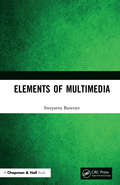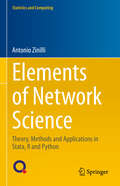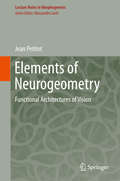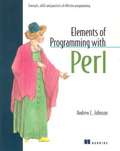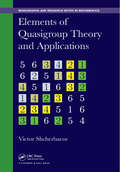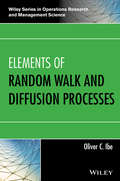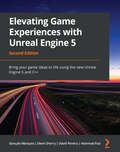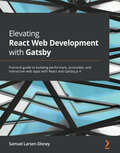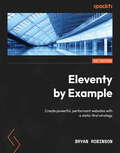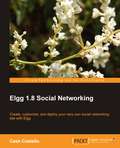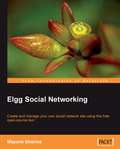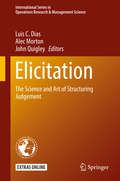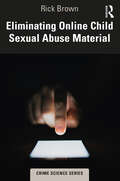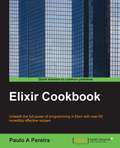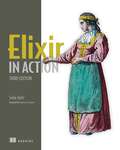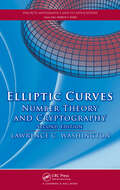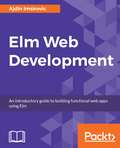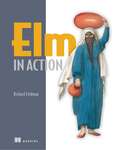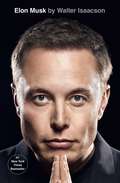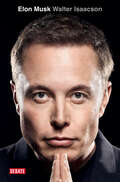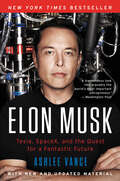- Table View
- List View
Elements of Information Theory
by Thomas M. Cover Joy A. ThomasThe latest edition of this classic is updated with new problem sets and materialThe Second Edition of this fundamental textbook maintains the book's tradition of clear, thought-provoking instruction. Readers are provided once again with an instructive mix of mathematics, physics, statistics, and information theory.All the essential topics in information theory are covered in detail, including entropy, data compression, channel capacity, rate distortion, network information theory, and hypothesis testing. The authors provide readers with a solid understanding of the underlying theory and applications. Problem sets and a telegraphic summary at the end of each chapter further assist readers. The historical notes that follow each chapter recap the main points.The Second Edition features:* Chapters reorganized to improve teaching* 200 new problems* New material on source coding, portfolio theory, and feedback capacity* Updated referencesNow current and enhanced, the Second Edition of Elements of Information Theory remains the ideal textbook for upper-level undergraduate and graduate courses in electrical engineering, statistics, and telecommunications.An Instructor's Manual presenting detailed solutions to all the problems in the book is available from the Wiley editorial department.
Elements of Multimedia
by Sreeparna BanerjeeElements of Multimedia presents a systematic introduction and integrated overview of the state-of-the-art innovations that make Multimedia a rapidly evolving technology in the digital domain. This book is also an invaluable resource for applied researchers. Some of the salient features of the book include: <P><P> <li>Overview of recent additions to multimedia like New Media, Digital Media, Social Media and Mobile Media. <li>This book provides a starting point for researchers wishing to pursue research in Multimedia. <li>Discussions on advances in Web Technology, particularly Web 2.0, as well as Multimedia Applications. <li>Detailed descriptions on different Multimedia elements like text, graphics, images, audio, video and animation. <li>Introduction to the concepts of data compression. <li>Various aspects of multimedia presentations. <li>Multimedia storage hardware. <li>Databases for Multimedia data storage and indexing schemes for accessing Multimedia data. <li>Multimedia communications and networking issues. <P><P>Each chapter ends with a review of the topics covered and a set of review questions to enable the student to go back to the chapter and recapitulate the subject matter. Answers to the Multiple-Choice Questions (MCQ) are provided at the end of the book. Solutions of problems are also provided.
Elements of Network Science: Theory, Methods and Applications in Stata, R and Python (Statistics and Computing)
by Antonio ZinilliThis book provides readers with a comprehensive guide to designing rigorous and effective network science tools using the statistical software platforms Stata, R, and Python. Network science offers a means to understand and analyze complex systems that involve various types of relationships. This text bridges the gap between theoretical understanding and practical application, making network science more accessible to a wide range of users. It presents the statistical models pertaining to individual network techniques, followed by empirical applications that use both built-in and user-written packages, and reveals the mathematical and statistical foundations of each model, along with demonstrations involving calculations and step-by-step code implementation. In addition, each chapter is complemented by a case study that illustrates one of the several techniques discussed. The introductory chapter serves as a roadmap for readers, providing an initial understanding of network science and guidance on the required packages, the second chapter focuses on the main concepts related to network properties. The next two chapters present the primary definitions and concepts in network science and various classes of graphs observed in real contexts. The final chapter explores the main social network models, including the family of exponential random graph models. Each chapter includes real-world data applications from the social sciences, using at least one of the platforms Stata, R, and Python, providing a more comprehensive understanding of the availability of network science methods across different software platforms. The underlying computer code and data sets are available online. The book will appeal to graduate students, researchers and data scientists, mainly from the social sciences, who seek theoretical and applied tools to implement network science techniques in their work.
Elements of Neurogeometry
by Jean PetitotThis book describes several mathematical models of the primary visual cortex, referring them to a vast ensemble of experimental data and putting forward an original geometrical model for its functional architecture, that is, the highly specific organization of its neural connections. The book spells out the geometrical algorithms implemented by this functional architecture, or put another way, the "neurogeometry" immanent in visual perception. Focusing on the neural origins of our spatial representations, it demonstrates three things: firstly, the way the visual neurons filter the optical signal is closely related to a wavelet analysis; secondly, the contact structure of the 1-jets of the curves in the plane (the retinal plane here) is implemented by the cortical functional architecture; and lastly, the visual algorithms for integrating contours from what may be rather incomplete sensory data can be modelled by the sub-Riemannian geometry associated with this contact structure. As such, it provides readers with the first systematic interpretation of a number of important neurophysiological observations in a well-defined mathematical framework. The book's neuromathematical exploration appeals to graduate students and researchers in integrative-functional-cognitive neuroscience with a good mathematical background, as well as those in applied mathematics with an interest in neurophysiology.
Elements of Programming with Perl
by Andrew JohnsonMany neophyte programmers now begin their careers by learning the metalanguage, Perl. But the books currently available on Perl assume their readers already understand the basics of writing and designing programs--when in fact they do not. The tutorial teaches programming right along with the particulars of Perl syntax, as well as good style and structure and maintainability of the code.
Elements of Quasigroup Theory and Applications (Chapman & Hall/CRC Monographs and Research Notes in Mathematics)
by Victor ShcherbacovThis book provides an introduction to quasigroup theory along with new structural results on some of the quasigroup classes. Many results are presented with some of them from mathematicians of the former USSR. These included results have not been published before in the western mathematical literature. In addition, many of the achievements obtained with regard to applications of quasigroups in coding theory and cryptology are described.
Elements of Random Walk and Diffusion Processes
by Oliver C. IbePresents an important and unique introduction to random walk theoryRandom walk is a stochastic process that has proven to be a useful model in understanding discrete-state discrete-time processes across a wide spectrum of scientific disciplines. Elements of Random Walk and Diffusion Processes provides an interdisciplinary approach by including numerous practical examples and exercises with real-world applications in operations research, economics, engineering, and physics.Featuring an introduction to powerful and general techniques that are used in the application of physical and dynamic processes, the book presents the connections between diffusion equations and random motion. Standard methods and applications of Brownian motion are addressed in addition to Levy motion, which has become popular in random searches in a variety of fields. The book also covers fractional calculus and introduces percolation theory and its relationship to diffusion processes.With a strong emphasis on the relationship between random walk theory and diffusion processes, Elements of Random Walk and Diffusion Processes features:Basic concepts in probability, an overview of stochastic and fractional processes, and elements of graph theoryNumerous practical applications of random walk across various disciplines, including how to model stock prices and gambling, describe the statistical properties of genetic drift, and simplify the random movement of molecules in liquids and gasesExamples of the real-world applicability of random walk such as node movement and node failure in wireless networking, the size of the Web in computer science, and polymers in physicsPlentiful examples and exercises throughout that illustrate the solution of many practical problemsElements of Random Walk and Diffusion Processes is an ideal reference for researchers and professionals involved in operations research, economics, engineering, mathematics, and physics. The book is also an excellent textbook for upper-undergraduate and graduate level courses in probability and stochastic processes, stochastic models, random motion and Brownian theory, random walk theory, and diffusion process techniques.
Elevating Game Experiences with Unreal Engine 5: Bring your game ideas to life using the new Unreal Engine 5 and C++
by Devin Sherry David Pereira Hammad Fozi Gonçalo MarquesGet hands-on with game development tools and techniques to build a game project using the latest version of Unreal Engine and C++, two of the most widely used tools in the game industryKey FeaturesKickstart your career or develop a new hobby by learning game development with Unreal Engine 5 and C++Learn techniques to prototype and develop your own ideas with key images printed in colorReinforce your skills with project-based learning by building a series of games from scratchBook DescriptionImmerse yourself in the Unreal game projects with this book, written by four highly experienced industry professionals with many years of combined experience with Unreal Engine. Elevating Game Experiences with Unreal Engine 5 will walk you through the latest version of Unreal Engine by helping you get hands-on with the game creation projects. The book starts with an introduction to the Unreal Editor and key concepts such as actors, blueprints, animations, inheritance, and player input. You'll then move on to the first of three projects, building a dodgeball game, where you'll learn the concepts of line traces, collisions, projectiles, user interface, and sound effects. You’ll also discover how to combine these concepts to showcase your new skills. The second project, a side-scroller game, will help you implement concepts such as animation blending, enemy AI, spawning objects, and collectibles. And finally, you'll cover the key concepts in creating a multiplayer environment as you work on the third project, an FPS game. By the end of this Unreal Engine book, you'll have a broad understanding of how to use the tools that the game engine provides to start building your own games.What you will learnCreate a fully functional third-person character and enemiesImplement navigation with keyboard, mouse, and gamepadProgram logic and game mechanics with collision and particle effectsExplore AI for games with Blackboards and behavior treesBuild character animations with animation blueprints and montagesPolish your game with stunning visual and sound effectsExplore the fundamentals of game UI using a heads-up displayDiscover how to implement multiplayer in your gamesWho this book is forThis book is for game developers looking to get started with using Unreal Engine 5 for their game development projects. Anyone who has used Unreal Engine before and wants to consolidate, improve, and apply their skills will find this book useful. To better grasp the concepts explained in this book, prior knowledge of C++ basics such as variables, functions, classes, polymorphism, and pointers is required. For full compatibility with the IDE used in this book, a Windows system is recommended
Elevating Game Experiences with Unreal Engine 5: Bring your game ideas to life using the new Unreal Engine 5 and C++, 2nd Edition
by Goncalo Marques Devin Sherry David Pereira Hammad FoziGet hands-on with game development tools and techniques to build game project using the latest version of Unreal Engine and C++, two of the most widely used tools in the games industryKey FeaturesKickstart your career or develop a new hobby by learning game development with Unreal Engine 5 and C++Learn techniques to prototype and develop your own ideas with key images printed in colorReinforce your skills with project-based learning by building a series of games from scratchBook DescriptionImmerse yourself in the Unreal game projects with this book, written by four highly experienced industry professionals with many years of combined experience with Unreal Engine. Elevating Game Experiences with Unreal Engine 5 will walk you through the latest version of Unreal Engine by helping you get hands-on with the game creation projects. The book starts with an introduction to the Unreal Editor and key concepts such as actors, blueprints, animations, inheritance, and player input. You'll then move on to the first of three projects, building a dodgeball game, where you'll learn the concepts of line traces, collisions, projectiles, user interface, and sound effects. You'll also discover how to combine these concepts to showcase your new skills. The second project, a side-scroller game, will help you implement concepts such as animation blending, enemy AI, spawning objects, and collectibles. And finally, you'll cover the key concepts in creating a multiplayer environment as you work on the third project, an FPS game. By the end of this Unreal Engine book, you'll have a broad understanding of how to use the tools that the game engine provides to start building your own games.What you will learnCreate a fully functional third-person character and enemiesImplement navigation with keyboard, mouse, and gamepadProgram logic and game mechanics with collision and particle effectsExplore AI for games with Blackboards and behavior treesBuild character animations with animation blueprints and montagesPolish your game with stunning visual and sound effectsExplore the fundamentals of game UI using a heads-up displayDiscover how to implement multiplayer in your gamesWho this book is forThis book is for game developers looking to get started with using Unreal Engine 5 for their game development projects. Anyone who has used Unreal Engine before and wants to consolidate, improve, and apply their skills will find this book useful. To better grasp the concepts explained in this book, prior knowledge of C++ basics such as variables, functions, classes, polymorphism, and pointers is required. For full compatibility with the IDE used in this book, a Windows system is recommended
Elevating React Web Development with Gatsby: Practical guide to building performant, accessible, and interactive web apps with React and Gatsby.js 4
by Samuel Larsen-DisneyLearn how to create SEO-friendly, powerful static websites using Gatsby by harnessing the power of ReactKey FeaturesUnderstand how to use Gatsby to build, test, and deploy an end-to-end website and manage SEOBuild reusable templates to streamline your workflowsCreate plugins, add authentication, and work with real-time dataBook DescriptionGatsby is a powerful React static site generator that enables you to create lightning-fast web experiences. With the latest version of Gatsby, you can combine your static content with server-side rendered and deferred static content to create a fully rounded application. Elevating React Web Development with Gatsby provides a comprehensive introduction for anyone new to GatsbyJS and will help you get up to speed in no time.Complete with hands-on tutorials and projects, this easy-to-follow guide starts by teaching you the core concepts of GatsbyJS. You'll then discover how to build performant, accessible, and scalable websites with the GatsbyJS framework. Once you've worked through the practical projects in the book, you'll be able to build anything from a personal website to large-scale applications with authentication and make your site rise through those SEO rankings.By the end of this Gatsby development book, you'll be well-versed in every aspect of the tool's performance and accessibility and have learned how to build client websites that your users will love.What you will learnUnderstand what GatsbyJS is, where it excels, and how to use itStructure and build a GatsbyJS site with confidenceElevate your site with an industry-standard approach to stylingConfigure your GatsbyJS projects with search engine optimization to improve their rankingGet to grips with advanced GatsbyJS concepts to create powerful and dynamic sitesSupercharge your site with translations for a global audienceDiscover how to use third-party services that provide interactivity to usersWho this book is forThis book is for web developers who want to use GatsbyJS with React to build better static and dynamic client-side apps. Prior experience of working with React basics is necessary. Knowledge of Node.js fundamentals will help you to get the most out of this web development book.
Eleventy by Example: Create powerful, performant websites with a static-first strategy
by Bryan RobinsonBuild faster static sites by leveraging CDN and creating custom tools and workflows with 5 real-world projectsPurchase of the print or Kindle book includes a free PDF eBookKey FeaturesLearn how to use and extend 11ty, one of the most flexible static site generators in the industry.Optimize your experience by customizing 11ty to suit various projects' needsCreate request-time experiences without recreating templates with 11ty ServerlessBook Description11ty is the dark horse of the Jamstack world, offering unparalleled flexibility and performance that gives it an edge against other static site generators such as Jekyll and Hugo. With it, developers can leverage the complete Node ecosystem and create blazing-fast, static-first websites that can be deployed from a content delivery network or a simple server. This book will teach you how to set up, customize, and make the most of 11ty in no time. Eleventy by Example helps you uncover everything you need to create your first 11ty website before diving into making more complex sites and extending 11ty's base functionality with custom short codes, plugins, and content types. Over the course of 5 interactive projects, you'll learn how to build basic websites, blogs, media sites, and static sites that will respond to user input without the need for a server. With these, you'll learn basic 11ty skills such as templates, collections, and data use, along with advanced skills such as plugin creation, image manipulation, working with a headless CMS, and the use of the powerful 11ty Serverless plugin. By the end of this book, you'll be well-equipped to leverage the capabilities of 11ty by implementing best practices and reusable techniques that can be applied across multiple projects, reducing the website launch time.What you will learnCreate a basic website with reusable templates and globally available dataBuild a blog using 11ty's collectionsSet up a photography site that uses the 11ty Image plugin to deploy properly sized imagesConnect a content management system to provide an enhanced editor and developer experienceModel an enhanced search experience with no dedicated server through serverless functions and 11ty ServerlessBoost productivity by creating custom 11ty tools and pluginsWho this book is forThis book is for anyone looking to build efficient websites while shipping less JavaScript to the client. Strong knowledge of HTML and CSS and beginner-level knowledge of JavaScript and the Node.js ecosystem, including querying APIs is a must.
Elgg 1.8 Social Networking
by Cash CostelloThis book provides more than just a step-by-step guide to installing and using Elgg. It includes practical advice gained through experience on what it takes to deploy and maintain an Elgg-based site. If you are a software developer or are familiar with PHP, it provides both a tutorial-based introduction and a quick reference guide so that you can quickly extend and customize Elgg. If you want to create a social networking site using Elgg and do not have a background in software development, this book provides all the information and advice that you need written just for you. If you are a developer, it also contains valuable tutorials and reference material so that you can begin writing code right away.
Elgg Social Networking
by Mayank SharmaThis book has a very easy-to-follow approach that will teach you how to do things with examples and lots of screenshots. As an example the book builds a community site for Linux administrators. This book is aimed at people interested in social networking and e-learning teachers.
Elicitation
by John Quigley Alec Morton Luis C. DiasThis book is about elicitation: the facilitation of the quantitative expression of subjective judgement about matters of fact, interacting with subject experts, or about matters of value, interacting with decision makers or stakeholders. It offers an integrated presentation of procedures and processes that allow analysts and experts to think clearly about numbers, particularly the inputs for decision support systems and models. This presentation encompasses research originating in the communities of structured probability elicitation/calibration and multi-criteria decision analysis, often unaware of each other's developments. Chapters 2 through 9 focus on processes to elicit uncertainty from experts, including the Classical Method for aggregating judgements from multiple experts concerning probability distributions; the issue of validation in the Classical Method; the Sheffield elicitation framework; the IDEA protocol; approaches following the Bayesian perspective; the main elements of structured expert processes for dependence elicitation; and how mathematical methods can incorporate correlations between experts. Chapters 10 through 14 focus on processes to elicit preferences from stakeholders or decision makers, including two chapters on problems under uncertainty (utility functions), and three chapters that address elicitation of preferences independently of, or in absence of, any uncertainty elicitation (value functions and ELECTRE). Two chapters then focus on cross-cutting issues for elicitation of uncertainties and elicitation of preferences: biases and selection of experts. Finally, the last group of chapters illustrates how some of the presented approaches are applied in practice, including a food security case in the UK; expert elicitation in health care decision making; an expert judgement based method to elicit nuclear threat risks in US ports; risk assessment in a pulp and paper manufacturer in the Nordic countries; and elicitation of preferences for crop planning in a Greek region.
Eliminating Online Child Sexual Abuse Material (Crime Science Series)
by Rick BrownThis book uses a crime science approach to explore the ways in which child sexual abuse material (CSAM) can be tackled. It describes the CSAM ecosystem, focusing on the ways in which it is produced, distributed and consumed and explores different interventions that can be used to tackle each issue. Eliminating Online Child Sexual Abuse Material provides a methodical approach to unpacking and understanding this growing problem, identifies approaches that have been shown to work and offers alternatives that might be tried. This analysis is set within a crime sciences context that draws on rational choice, routine activities, situation crime prevention and environmental criminology to better understand the nature of the problem and the potential ways in which it may be solved. This book is intended for policy-makers and practitioners working in child protection, online harms and related areas and for students studying sexual violence or internet-related crime. The book will also be of interest to crime scientists as it provides another example of how the approach can be used to understand and reduce crime.
Elixir Cookbook
by Paulo A PereiraThis book is intended for users with some knowledge of the Elixir language syntax and basic data types/structures. Although this is a cookbook and no sequential reading is required, the book's structure will allow less advanced users who follow it to be gradually exposed to some of Elixir's features and concepts specific to functional programming. To get the most out of this book, you need to be well versed with Erlang.
Elixir in Action
by Sasa JuricSummaryRevised and updated for Elixir 1.7, Elixir in Action, Second Edition teaches you how to apply Elixir to practical problems associated with scalability, fault tolerance, and high availability. Along the way, you'll develop an appreciation for, and considerable skill in, a functional and concurrent style of programming.Purchase of the print book includes a free eBook in PDF, Kindle, and ePub formats from Manning Publications.About the TechnologyWhen you're building mission-critical software, fault tolerance matters. The Elixir programming language delivers fast, reliable applications, whether you're building a large-scale distributed system, a set of backend services, or a simple web app. And Elixir's elegant syntax and functional programming mindset make your software easy to write, read, and maintain.About the BookElixir in Action, Second Edition teaches you how to build production-quality distributed applications using the Elixir programming language. Author Saša Jurić introduces this powerful language using examples that highlight the benefits of Elixir's functional and concurrent programming. You'll discover how the OTP framework can radically reduce tedious low-level coding tasks. You'll also explore practical approaches to concurrency as you learn to distribute a production system over multiple machines. What's insideUpdated for Elixir 1.7Functional and concurrent programmingIntroduction to distributed system designCreating deployable releasesAbout the ReaderYou'll need intermediate skills with client/server applications and a language like Java, C#, or Ruby. No previous experience with Elixir required.About the AuthorSaša Jurić is a developer with extensive experience using Elixir and Erlang in complex server-side systems.Table of ContentsFirst stepsBuilding blocksControl flowData abstractionsConcurrency primitivesGeneric server processesBuilding a concurrent systemFault-tolerance basicsIsolating error effectsBeyond GenServerWorking with componentsBuilding a distributed systemRunning the system
Elixir in Action, Third Edition (In Action)
by Saša JuricFully updated to Elixir 1.15, this authoritative bestseller reveals how Elixir tackles problems of scalability, fault tolerance, and high availability.Thousands of developers have learned to build applications in Elixir by using Saša Juric&’s Elixir in Action. You&’ll skip the programming basics or 101 introductions; this book builds on your existing knowledge to get you quickly writing real Elixir code. Along the way, you'll develop an appreciation for, and considerable skill in, functional and concurrent programming. Inside Elixir in Action, Third Edition you&’ll find: Updates for Elixir 1.15 Elixir modules, functions, and type system Functional and concurrent programming Introduction to distributed system design Creating deployable releases Fully updated to Elixir 1.15, this book contains new coverage of working with application configuration and the latest OTP releases. It teaches you the underlying principles and functional concepts of Elixir, and how each piece fits into the bigger picture of building production-ready systems with Elixir, Erlang, and the OTP framework. Foreword by Francesco Cesarini. About the technology With best-in-class fault tolerance and concurrency, a pragmatic approach to functional programming, and the power to operate at scale, Elixir is the perfect choice for mission-critical software. Start reading Elixir in Action, and you&’ll quickly understand why Elixir creator José Valim says it &“...tops the list&” of Elixir books. About the book Elixir in Action, Third Edition teaches you how to create distributed applications and server-side systems using Elixir and the Erlang VM. This Third Edition from Elixir expert Saša Juric is fully updated to include the latest features of Elixir 1.15. In it, you&’ll master the foundations of the language, discover how the OTP framework minimizes tedious boilerplate code, and explore numerous examples that ensure you&’re learning hands-on. What's inside Elixir modules, functions, and type system Functional and concurrent programming Introduction to distributed system design Creating deployable releases About the reader For programmers comfortable with client/server applications. No experience with Elixir, Erlang, or functional programming required. About the author Saša Juric uses Elixir and Erlang to build fault-tolerant, scalable, highly concurrent systems. Technical editor on this book was Marius Butuc. Table of Contents PART 1 Functional Elixir 1 First steps 2 Building blocks 3 Control flow 4 Data abstractions PART 2 CONCURRENT ELIXIR 5 Concurrency primitives 6 Generic server processes 7 Building a concurrent system 8 Fault tolerance basics 9 Isolating error effects 10 Beyond GenServer PART 3 PRODUCTION 11 Working with components 12 Building a distributed system 13 Running the system
Ellen DeGeneres: From Comedy Club to Talk Show (Extraordinary Success with a High School)
by Jaime SebaIn the last few decades, more and more people are going to college to further their education. It's hard to become a scientist, a professor, or a businessperson without getting some sort of college degree--but college isn't always necessary to achieve success. Some people are ready to enter the workforce right after high school. Ellen DeGeneres was one of those people. The comedian began her career doing stand-up routines in New Orleans coffee houses. Today, Ellen has one of the most successful talk shows on television and stars in commercials for everything from credit cards to makeup. She's even judged "American Idol"! And what's most amazing about her story is that the charming talk show host has done it all without a college degree!
Elliptic Curves: Number Theory and Cryptography, Second Edition (Discrete Mathematics and Its Applications)
by Lawrence C. WashingtonLike its bestselling predecessor, Elliptic Curves: Number Theory and Cryptography, Second Edition develops the theory of elliptic curves to provide a basis for both number theoretic and cryptographic applications. With additional exercises, this edition offers more comprehensive coverage of the fundamental theory, techniques, and application
Elm Web Development: An introductory guide to building functional web apps using Elm
by Ajdin ImsirovicExplore why ELM is a great alternative to using pure JavaScript and other JS-based solutions by building complete apps and websites.Key FeaturesDevelop your own scalable and modular web applications with Elm to make web development less messy compared to your JavaScript appsCreate personal portfolio website, a weather application, and a unit conversion website, and integrate your Elm apps with Rails 5Boost the performance of your application with no runtime exceptions and JavaScript interoperabilityBook DescriptionWeb development with JavaScript usually involves dealing with performance and maintenance issues. JavaScript fatigue makes it difficult for many developers to keep up with the increasing complexity posed by the multitude of JavaScript frameworks with changing versions, and the need to use different tools such as task runners, module bundlers, compilers, testing suites, linting and debuggers. Elm is an easy-to-learn, functional programming language that simplifies web development by eliminating the complexity associated with using JavaScript for web development. Elm is a statically typed language and thus makes a front end web developer's life easier by preventing run-time errors.You will begin by seeing the bigger picture of where Elm fits into the web development world and learning the basics of Elm programming. Firstly, you will get a taste for web development with Elm by developing a simple fizz-buzz app. Next you will get hands-on with advanced Elm concepts as you develop your own personal blogging website, a unit conversion app and a weather app with Elm. Finally, you will also learn how to integrate Elm with a Rails 5 app with the help of Webpack. By the end of the book you will have learned Elm programming, and its applications, and will appreciate how Elm simplifies web development for you.What you will learnProgramming with the Elm language, its syntax and core concepts Using Elm for front end web development projectsDeveloping complete websites with ElmDecoding JSON into ElmIntegrating Elm with the standard front end web development technologiesIntegrating Elm with back-end frameworksTesting your applications in ElmWho this book is forThis book is for frontend web developers who want to learn a simpler way of developing their applications. A knowledge of the basics of CSS and Bootstrap is required.
Elm in Action
by Richard FeldmanSummary Elm is more than just a cutting-edge programming language, it&’s a chance to upgrade the way you think about building web applications. Once you get comfortable with Elm&’s refreshingly different approach to application development, you&’ll be working with a clean syntax, dependable libraries, and a delightful compiler that essentially eliminates runtime exceptions. Elm compiles to JavaScript, so your code runs in any browser, and Elm&’s best-in-class rendering speed will knock your socks off. Let&’s get started! Purchase of the print book includes a free eBook in PDF, Kindle, and ePub formats from Manning Publications. About the technology Simply put, the Elm programming language transforms the way you think about frontend web development. Elm&’s legendary compiler is an incredible assistant, giving you the precise and user-friendly support you need to work efficiently. Elm applications have small bundle sizes that run faster than JavaScript frameworks and are famously easy to maintain as they grow. The catch? Elm isn&’t JavaScript, so you&’ll have some new skills to learn. About the book Elm in Action teaches you the Elm language along with a new approach to coding frontend applications. Chapter by chapter, you&’ll create a full-featured photo-browsing app, learning as you go about Elm&’s modular architecture, Elm testing, and how to work seamlessly with your favorite JavaScript libraries. You&’ll especially appreciate author and Elm core team member Richard Feldman&’s unique insights, based on his thousands of hours writing production code in Elm. When you&’re done, you&’ll have a toolbox of new development skills and a stunning web app for your portfolio. What's inside Scalable design for production web applications Single-page applications in Elm Data modeling in Elm Accessing JavaScript from Elm About the reader For web developers with no prior experience in Elm or functional programming. About the author Richard Feldman is a software engineer at NoRedInk and a well-known member of the Elm community. Table of Contents PART 1 - GETTING STARTED 1. Welcome to Elm 2. Your first Elm application 3. Compiler as assistant PART 2 - PRODUCTION-GRADE ELM 4. Talking to servers 5. Talking to JavaScript 6. Testing PART 3 - BUILDING BIGGER 7. Data modeling 8. Single-page applications
Elon Musk
by Walter IsaacsonThe #1 New York Times and global bestseller from Walter Isaacson—the acclaimed author of Steve Jobs, Einstein: His Life and World, Benjamin Franklin, and Leonardo da Vinci—is the astonishingly intimate story of the most fascinating, controversial innovator of modern times. For two years, Isaacson shadowed Elon Musk as he executed his vision for electric vehicles at Tesla, space exploration with SpaceX, the AI revolution, and the takeover of Twitter and its conversion to X. The result is the definitive portrait of the mercurial pioneer that offers clues to his political instincts, future ambitions, and overall worldview. When Elon Musk was a kid in South Africa, he was regularly beaten by bullies. One day a group pushed him down some concrete steps and kicked him until his face was a swollen ball of flesh. He was in the hospital for a week. But the physical scars were minor compared to the emotional ones inflicted by his father, an engineer, rogue, and charismatic fantasist. His father&’s impact on his psyche would linger. He developed into a tough yet vulnerable man-child, prone to abrupt Jekyll-and-Hyde mood swings, with an exceedingly high tolerance for risk, a craving for drama, an epic sense of mission, and a maniacal intensity that was callous and at times destructive. At the beginning of 2022—after a year marked by SpaceX launching thirty-one rockets into orbit, Tesla selling a million cars, and him becoming the richest man on earth—Musk spoke ruefully about his compulsion to stir up dramas. &“I need to shift my mindset away from being in crisis mode, which it has been for about fourteen years now, or arguably most of my life,&” he said. It was a wistful comment, not a New Year&’s resolution. Even as he said it, he was secretly buying up shares of Twitter, the world&’s ultimate playground. Over the years, whenever he was in a dark place, his mind went back to being bullied on the playground. Now he had the chance to own the playground. For two years, Isaacson shadowed Musk, attended his meetings, walked his factories with him, and spent hours interviewing him, his family, friends, coworkers, and adversaries. The result is the revealing inside story, filled with amazing tales of triumphs and turmoil, that addresses the question: are the demons that drive Musk also what it takes to drive innovation and progress?
Elon Musk (edición en español)
by Walter IsaacsonDel autor de Steve Jobs y otras grandes biografías, todas ellas éxitos internacionales de ventas, esta es la historia asombrosamente íntima del innovador más fascinante y polémico del mundo, un visionario que ha roto todos los moldes y ha conducido al mundo a la era de los vehículos eléctricos, la exploración espacial privada y la inteligencia artificial. Ah, y el mismo que compró Twitter.Cuando Elon Musk era un niño en Sudáfrica, sufría a menudo acoso escolar. Un día un grupo de niños lo empujó por unas escaleras de hormigón y le patearon hasta que su cara se hinchó como una pelota. Pasó una semana en el hospital. Pero las cicatrices físicas fueron insignificantes comparadas con las emocionales, las que le había causado su padre, un canalla, ingeniero carismático y fantasioso. Cuando Elon llegó a casa tras ser dado de alta del hospital, su padre le reprendió. «Tuve que escucharlo durante una hora mientras me gritaba, me llamaba idiota y me decía que era un inútil», recuerda. El impacto psicológico que su padre le causó perduró. Se convirtió en un joven fuerte pero vulnerable al mismo tiempo, propenso a bruscos cambios de humor -a lo Jekyll y Hyde-, con una gran tolerancia al riesgo, ansias de drama, un épico sentido de misión y una intensidad maníaca, cruel y a veces destructiva.A principios de 2022, después de un año marcado por el lanzamiento de treinta y un satélites de SpaceX, la venta de un millón de coches de Tesla y de convertirse en el hombre más rico de la tierra, Musk confesó con arrepentimiento su impulso por provocar el drama. «Necesito cambiar mi forma de pensar para que deje de estar en modo crisis, como lo he estado en los últimos catorce años, o probablemente toda mi vida», explicó.Fue un comentario melancólico, no un propósito de año nuevo. Cuando hizo la promesa, estaba comprando en secreto acciones de Twitter, el patio de recreo por excelencia. Con los años, cuando se encontraba en un momento difícil, se veía transportado de nuevo al acoso que sufrió en el patio del colegio. Ahora tenía la oportunidad de poseerlo. Durante dos años, Isaacson fue la sombra de Musk, asistió a sus reuniones, recorrió juntos sus fábricas, y pasó horas entrevistándolo a él, a su familia, amigos, compañeros y adversarios. El resultado es un relato íntimo y revelador, repleto de historias asombrosas, triunfos y perturbaciones, que aborda la pregunta: ¿son los demonios que mueven a Musk también lo que se necesita para impulsar la innovación y el progreso?
Elon Musk: Tesla, SpaceX, and the Quest for a Fantastic Future
by Ashlee Vance<p>In the spirit of Steve Jobs and Moneyball, <i>Elon Musk</i> is both an illuminating and authorized look at the extraordinary life of one of Silicon Valley's most exciting, unpredictable, and ambitious entrepreneurs--a real-life Tony Stark--and a fascinating exploration of the renewal of American invention and its new "makers". <p>Ashlee Vance spotlights the technology and vision of Elon Musk, the renowned entrepreneur and innovator behind SpaceX, Tesla, and SolarCity, who sold one of his Internet companies, PayPal, for $1.5 billion. Ashlee Vance captures the full spectacle and arc of the genius's life and work, from his tumultuous upbringing in South Africa and flight to the United States to his dramatic technical innovations and entrepreneurial pursuits. <p>Vance uses Musk's story to explore one of the pressing questions of our age: can the nation of inventors and creators who led the modern world for a century still compete in an age of fierce global competition? He argues that Musk--one of the most unusual and striking figures in American business history--is a contemporary, visionary amalgam of legendary inventors and industrialists including Thomas Edison, Henry Ford, Howard Hughes, and Steve Jobs. More than any other entrepreneur today, Musk has dedicated his energies and his own vast fortune to inventing a future that is as rich and far-reaching as the visionaries of the golden age of science-fiction fantasy. <p>Thorough and insightful, <i>Elon Musk</i> brings to life a technology industry that is rapidly and dramatically changing by examining the life of one of its most powerful and influential titans.</p> <p><b>A New York Times Bestseller</b></p>
